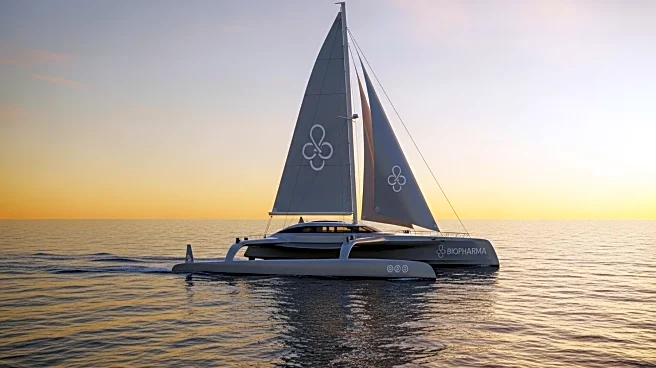What's Happening?
Vela Transport, a French company, is advancing the construction of its first wind-powered cargo trimaran, named L'avion des Mers, with the aim of launching a transatlantic service by late 2026. The vessel, currently under construction in the Philippines, has secured Japan's Takeda Pharmaceutical as its first major client. This partnership aligns with Takeda's commitment to achieving net-zero emissions by 2040. The trimaran, designed specifically for pharmaceutical transport, will feature temperature-controlled, renewable energy-powered refrigeration systems. The vessel's construction includes two carbon-fiber masts and solar panels, enabling it to operate primarily on wind power.
Why It's Important?
This development marks a significant step towards sustainable maritime logistics, particularly in the pharmaceutical sector. By utilizing wind and solar power, Vela Transport's initiative could reduce carbon emissions associated with transatlantic shipping. The partnership with Takeda Pharmaceutical underscores the growing demand for environmentally friendly logistics solutions. If successful, this model could influence other industries to adopt similar sustainable practices, potentially leading to a broader shift in global shipping standards. The project also highlights the potential for innovation in renewable energy applications within traditional industries.
What's Next?
Vela Transport plans to expand its fleet to five vessels by 2028, aiming to transport up to 48,000 tons of goods annually. The company intends to leverage advanced maritime technologies and efficient port operations to enhance service speed and reliability. As the project progresses, it may attract additional clients seeking sustainable shipping solutions, potentially influencing regulatory frameworks and industry standards. The success of this initiative could prompt further investment in renewable energy technologies within the maritime sector.
Beyond the Headlines
The use of a trimaran design offers inherent stability and eliminates the need for water ballast, which is a unique feature in cargo vessels. This innovation could set a precedent for future ship designs, emphasizing sustainability and efficiency. Additionally, the project's focus on dismantling and recycling components aligns with circular economy principles, potentially influencing future manufacturing practices in the maritime industry.









